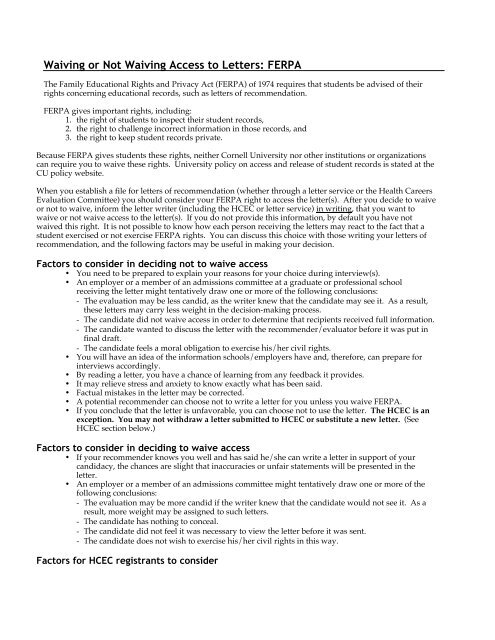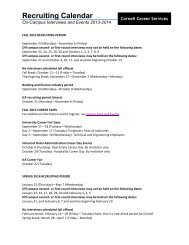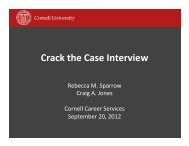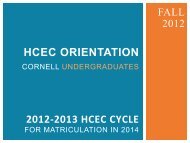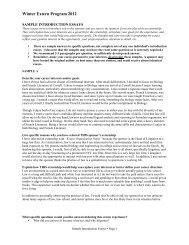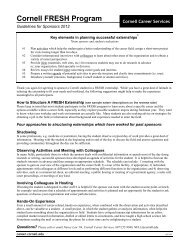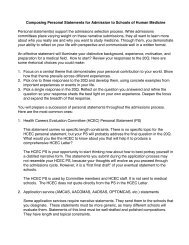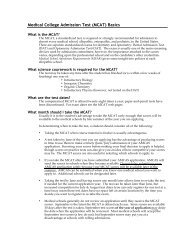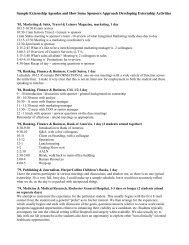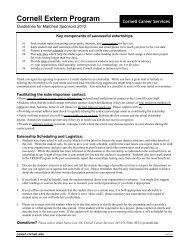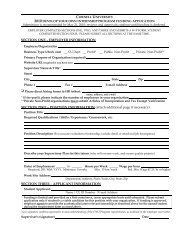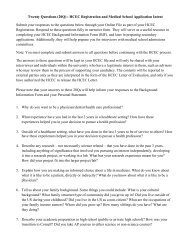Waiving or Not Waiving Access to Letters - Cornell Career Services ...
Waiving or Not Waiving Access to Letters - Cornell Career Services ...
Waiving or Not Waiving Access to Letters - Cornell Career Services ...
You also want an ePaper? Increase the reach of your titles
YUMPU automatically turns print PDFs into web optimized ePapers that Google loves.
<strong>Waiving</strong> <strong>or</strong> <strong>Not</strong> <strong>Waiving</strong> <strong>Access</strong> <strong>to</strong> <strong>Letters</strong>: FERPA<br />
The Family Educational Rights and Privacy Act (FERPA) of 1974 requires that students be advised of their<br />
rights concerning educational rec<strong>or</strong>ds, such as letters of recommendation.<br />
FERPA gives imp<strong>or</strong>tant rights, including:<br />
1. the right of students <strong>to</strong> inspect their student rec<strong>or</strong>ds,<br />
2. the right <strong>to</strong> challenge inc<strong>or</strong>rect inf<strong>or</strong>mation in those rec<strong>or</strong>ds, and<br />
3. the right <strong>to</strong> keep student rec<strong>or</strong>ds private.<br />
Because FERPA gives students these rights, neither C<strong>or</strong>nell University n<strong>or</strong> other institutions <strong>or</strong> <strong>or</strong>ganizations<br />
can require you <strong>to</strong> waive these rights. University policy on access and release of student rec<strong>or</strong>ds is stated at the<br />
CU policy website.<br />
When you establish a file f<strong>or</strong> letters of recommendation (whether through a letter service <strong>or</strong> the Health <strong>Career</strong>s<br />
Evaluation Committee) you should consider your FERPA right <strong>to</strong> access the letter(s). After you decide <strong>to</strong> waive<br />
<strong>or</strong> not <strong>to</strong> waive, inf<strong>or</strong>m the letter writer (including the HCEC <strong>or</strong> letter service) in writing, that you want <strong>to</strong><br />
waive <strong>or</strong> not waive access <strong>to</strong> the letter(s). If you do not provide this inf<strong>or</strong>mation, by default you have not<br />
waived this right. It is not possible <strong>to</strong> know how each person receiving the letters may react <strong>to</strong> the fact that a<br />
student exercised <strong>or</strong> not exercise FERPA rights. You can discuss this choice with those writing your letters of<br />
recommendation, and the following fact<strong>or</strong>s may be useful in making your decision.<br />
Fact<strong>or</strong>s <strong>to</strong> consider in deciding not <strong>to</strong> waive access<br />
• You need <strong>to</strong> be prepared <strong>to</strong> explain your reasons f<strong>or</strong> your choice during interview(s).<br />
• An employer <strong>or</strong> a member of an admissions committee at a graduate <strong>or</strong> professional school<br />
receiving the letter might tentatively draw one <strong>or</strong> m<strong>or</strong>e of the following conclusions:<br />
- The evaluation may be less candid, as the writer knew that the candidate may see it. As a result,<br />
these letters may carry less weight in the decision-making process.<br />
- The candidate did not waive access in <strong>or</strong>der <strong>to</strong> determine that recipients received full inf<strong>or</strong>mation.<br />
- The candidate wanted <strong>to</strong> discuss the letter with the recommender/evaluat<strong>or</strong> bef<strong>or</strong>e it was put in<br />
final draft.<br />
- The candidate feels a m<strong>or</strong>al obligation <strong>to</strong> exercise his/her civil rights.<br />
• You will have an idea of the inf<strong>or</strong>mation schools/employers have and, theref<strong>or</strong>e, can prepare f<strong>or</strong><br />
interviews acc<strong>or</strong>dingly.<br />
• By reading a letter, you have a chance of learning from any feedback it provides.<br />
• It may relieve stress and anxiety <strong>to</strong> know exactly what has been said.<br />
• Factual mistakes in the letter may be c<strong>or</strong>rected.<br />
• A potential recommender can choose not <strong>to</strong> write a letter f<strong>or</strong> you unless you waive FERPA.<br />
• If you conclude that the letter is unfav<strong>or</strong>able, you can choose not <strong>to</strong> use the letter. The HCEC is an<br />
exception. You may not withdraw a letter submitted <strong>to</strong> HCEC <strong>or</strong> substitute a new letter. (See<br />
HCEC section below.)<br />
Fact<strong>or</strong>s <strong>to</strong> consider in deciding <strong>to</strong> waive access<br />
• If your recommender knows you well and has said he/she can write a letter in supp<strong>or</strong>t of your<br />
candidacy, the chances are slight that inaccuracies <strong>or</strong> unfair statements will be presented in the<br />
letter.<br />
• An employer <strong>or</strong> a member of an admissions committee might tentatively draw one <strong>or</strong> m<strong>or</strong>e of the<br />
following conclusions:<br />
- The evaluation may be m<strong>or</strong>e candid if the writer knew that the candidate would not see it. As a<br />
result, m<strong>or</strong>e weight may be assigned <strong>to</strong> such letters.<br />
- The candidate has nothing <strong>to</strong> conceal.<br />
- The candidate did not feel it was necessary <strong>to</strong> view the letter bef<strong>or</strong>e it was sent.<br />
- The candidate does not wish <strong>to</strong> exercise his/her civil rights in this way.<br />
Fact<strong>or</strong>s f<strong>or</strong> HCEC registrants <strong>to</strong> consider
• You may waive <strong>or</strong> not waive the right of access <strong>to</strong> your C<strong>or</strong>nell Health <strong>Career</strong>s Evaluation<br />
Committee letter of evaluation and/<strong>or</strong> the letter(s) of recommendation in your file in any<br />
combination you choose: all, none, some.<br />
• If you view a letter and disagree with the subjective opinion expressed <strong>or</strong> believe the inf<strong>or</strong>mation is<br />
inaccurate, you may place a rebuttal in the HCEC file; it will be sent with the letters <strong>to</strong> the<br />
professional schools.<br />
• The HCEC process includes substantial review and oversight. It is not likely that an inaccuracy will<br />
be stated in the letter.


